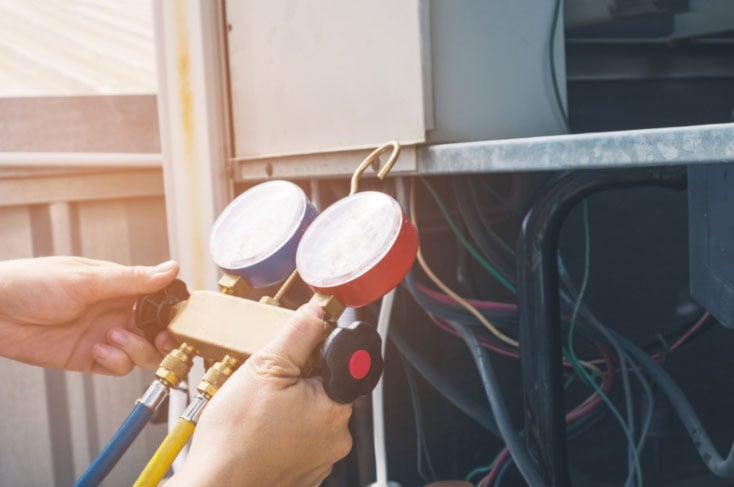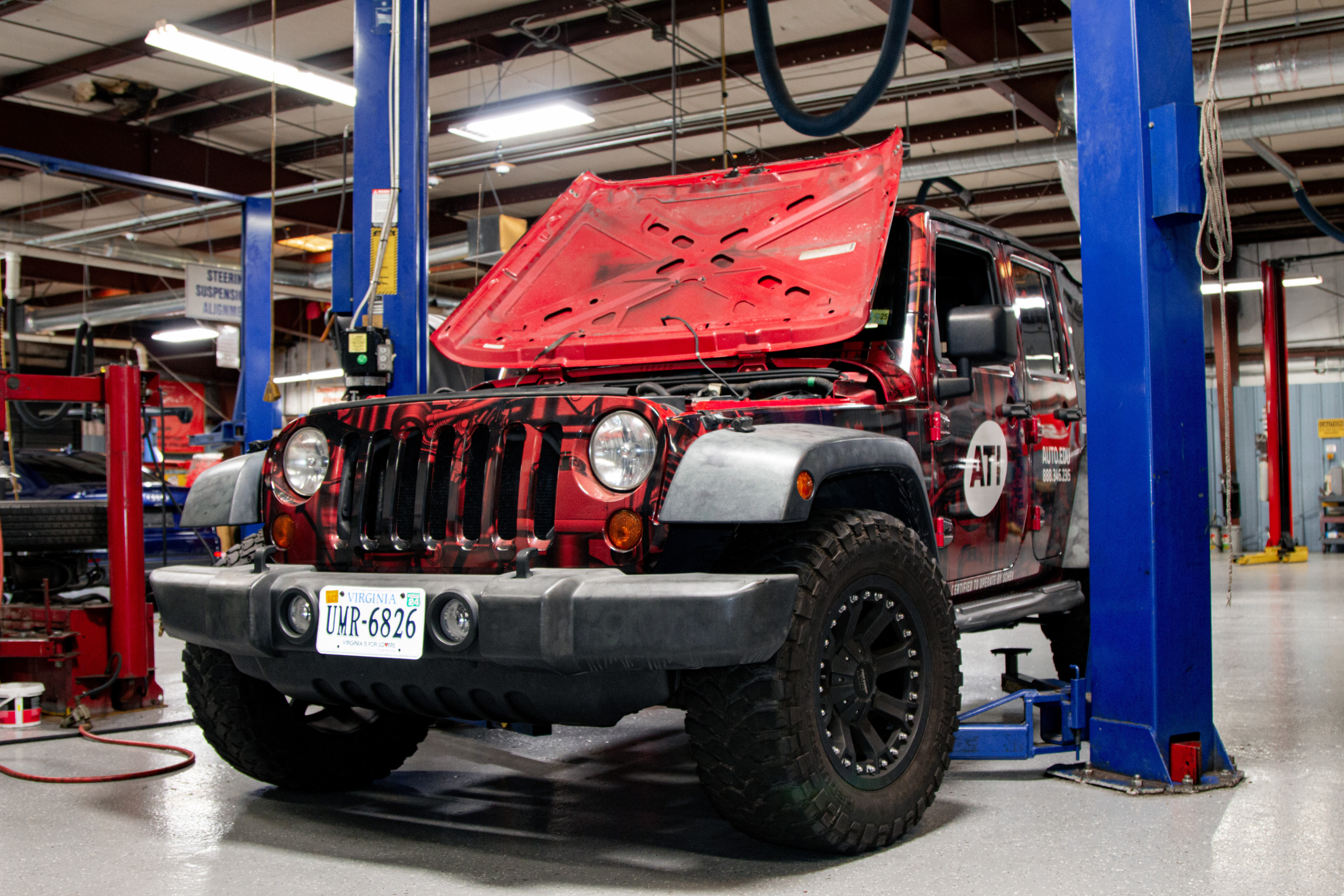What is a HVAC Technician

When you enter a cool building on a hot summer day or stay warm and cozy through freezing temperatures, you’re likely benefiting from the expertise of an HVAC technician. But what is HVAC technician work, and what makes this career both essential and rewarding?
HVAC stands for Heating, Ventilation, and Air Conditioning. HVAC technicians are trained professionals who install, maintain, and repair systems that control temperature, humidity, and air quality in residential, commercial, and industrial buildings. From small split systems in homes to large-scale chillers and boilers in office buildings, HVAC technicians ensure these systems function properly and efficiently, keeping people comfortable and environments safe.
Quick Links
-
What is a Certified HVAC Technician?
-
What is a Commercial HVAC Technician?
-
What is the Difference Between a Certified Technician and Commercial Technician?
-
What Education is Needed to Become an HVAC Technician?
-
What is Required to Be an HVAC Technician?
-
Other Requirements to Become an HVAC Technician
What is a Certified HVAC Technician?
A certified HVAC technician is a professional who has completed formal training and earned credentials verifying their skills and knowledge in HVAC systems. Certification means that a technician has passed standardized exams—usually administered by national organizations such as the Environmental Protection Agency (EPA) or North American Technician Excellence (NATE)—that test their competency in areas like refrigeration handling, safety protocols, electrical systems, and diagnostics.
Certification is often required by employers and may also be mandated by state or local authorities. For example, the EPA requires anyone who works with refrigerants to be certified under Section 608 of the Clean Air Act. Other certifications demonstrate specialization in areas like heat pump systems or air distribution.
In essence, being certified is a mark of credibility. It shows clients and employers that the technician understands the complexities of HVAC systems and can work safely and efficiently within legal and technical standards.
What is a Commercial HVAC Technician?
A commercial HVAC technician specializes in systems that serve larger-scale buildings—offices, schools, hospitals, warehouses, and retail stores. Unlike residential systems that typically service one household, commercial systems are often centralized and designed to manage climate control across thousands of square feet. These systems might include rooftop units (RTUs), variable air volume (VAV) systems, chillers, and boilers.
So, what is a commercial HVAC technician doing differently from a residential technician? Their work typically involves:
- Designing or maintaining systems that balance air across multiple zones
- Managing larger refrigerant loads and more complex ventilation systems
- Understanding building codes and industry standards specific to commercial settings
- Integrating HVAC systems with smart building technologies and automation platforms
Because of the scale and complexity, commercial technicians often need deeper knowledge in system design, airflow management, and industrial safety protocols. It’s a specialization that requires both technical skill and a clear understanding of building infrastructure.

What is the Difference Between a Certified Technician and Commercial Technician?
This question comes up a lot: what’s the difference between being a certified technician and a commercial technician?
- A certified technician is defined by qualification. They’ve passed required tests and hold recognized credentials.
- A commercial technician is defined by specialization. They work in specific settings with larger and more complex systems.
The two are not mutually exclusive. Most commercial HVAC technicians are also certified, but not all certified technicians specialize in commercial work. Some prefer residential systems, while others move into industrial HVAC or refrigeration.
Think of certification as the foundation—a necessary step in becoming a well-rounded technician. Specialization, like commercial HVAC, is a career direction built on that foundation.
What Education is Needed to Become an HVAC Technician?
One of the most common questions people ask is: what education is needed to become an HVAC technician?
Typically, the path starts with a high school diploma or GED, followed by formal training through a technical school, community college, or trade-focused program. These programs usually offer diplomas or associate degrees in HVAC technology and include instruction in:
- Thermodynamics and heat transfer
- Electrical systems and controls
- Airflow dynamics and duct design
- Refrigeration cycles and refrigerant handling
- Mechanical code and safety standards
Many programs include hands-on labs or simulated work environments where students get to practice tasks like brazing copper lines, wiring control panels, or testing airflow with specialized tools.
In addition to classroom learning, HVAC education often prepares students to take certification exams such as the EPA 608 and may include prep for exams by NATE, HVAC Excellence, or other recognized organizations.
While formal education isn’t always legally required, it’s often the fastest route to entry into the field, especially for those who want to pursue certifications or specialize.
What is Required to Be an HVAC Technician?
Beyond education, there are a number of practical and legal requirements to consider. So, what is required to be an HVAC technician beyond the classroom?
- Certification (Federal and State): As mentioned, EPA 608 certification is mandatory for anyone working with refrigerants. Some states or municipalities also require licenses, which may include written exams and proof of work experience.
- Apprenticeship or Work Experience: Many new technicians enter the field through an apprenticeship, where they learn from seasoned professionals on job sites. Others may be hired as entry-level techs right after school and receive on-the-job training.
- Basic Tools and Equipment: HVAC techs are often expected to own or acquire tools like multimeters, gauges, thermometers, pipe cutters, and cordless drills.
- Driver’s License and Clean Record: Because techs often travel to job sites, a valid driver’s license and a clean driving history are typically required.
- Physical Ability: Technicians frequently work in tight, awkward spaces, on rooftops, or in basements. They must be able to lift heavy equipment and tolerate heat, cold, or cramped environments.
Other Requirements to Become an HVAC Technician
Education and licensing are just part of the story. There are also personal attributes and soft skills that can set an HVAC technician apart.
- Problem-solving skills: Diagnosing a malfunctioning compressor or tracing an electrical short requires logical thinking and a sharp eye for detail.
- Time management: HVAC techs often juggle multiple appointments per day and need to stay organized to keep up with demand.
- Customer service: Especially in residential or light commercial roles, technicians need to explain technical issues clearly and calmly to clients who may be stressed or frustrated.
- Adaptability: No two days—or systems—are the same. A technician might be doing preventative maintenance one morning and an emergency system repair by the afternoon.
- Interest in technology: Today’s systems include smart thermostats, IoT sensors, and building automation. Staying current with new tech is a growing part of the job.
Conclusion
So, what is HVAC technician work all about? It’s a dynamic, hands-on career focused on solving problems, helping people, and keeping the systems we depend on every day running smoothly. Whether you’re working on a home furnace, a massive industrial chiller, or a state-of-the-art smart HVAC system, this profession offers variety, challenge, and the satisfaction of skilled craftsmanship.
HVAC technicians are more than mechanics—they’re system thinkers, safety specialists, and customer service pros. If you're looking for a career that blends technical knowledge with practical application, the HVAC field may be worth serious consideration. Learn more about HVAC training here.
Industry Knowledge
Welcome to the Advanced Technology Institute's Blog, your resource for industry insights and discussions on technologies shaping the future of automotive, heavy vehicle, hvac, welding, and other related career paths.
Explore how ATI's curriculum and hands-on learning opportunities can propel your career in the tech-driven world.
%20(1).jpg)
